Corporation and Commercial Law: Liability and Directors' Duties
VerifiedAdded on 2021/06/17
|7
|1755
|70
Homework Assignment
AI Summary
This document provides a detailed analysis of three legal issues within corporation and commercial law. The first answer examines the effectiveness of exclusion clauses in limiting liability, referencing the cases of Olley v Marlborough Court and L'Estrange v Graucob. The second answer explores the duties of company directors regarding financial statements and their reliance on expert advice, referencing the Corporations Act 2001 (Cth), particularly section 180(2) and section 189. The third answer discusses breaches of directors' duties, specifically under section 181 of the Corporations Act, concerning acting in the best interest of the corporation and the implications of issuing special shares. Each answer includes an issue statement, relevant law, application of the law to the facts, and a conclusion, supported by references to relevant legislation and case law.
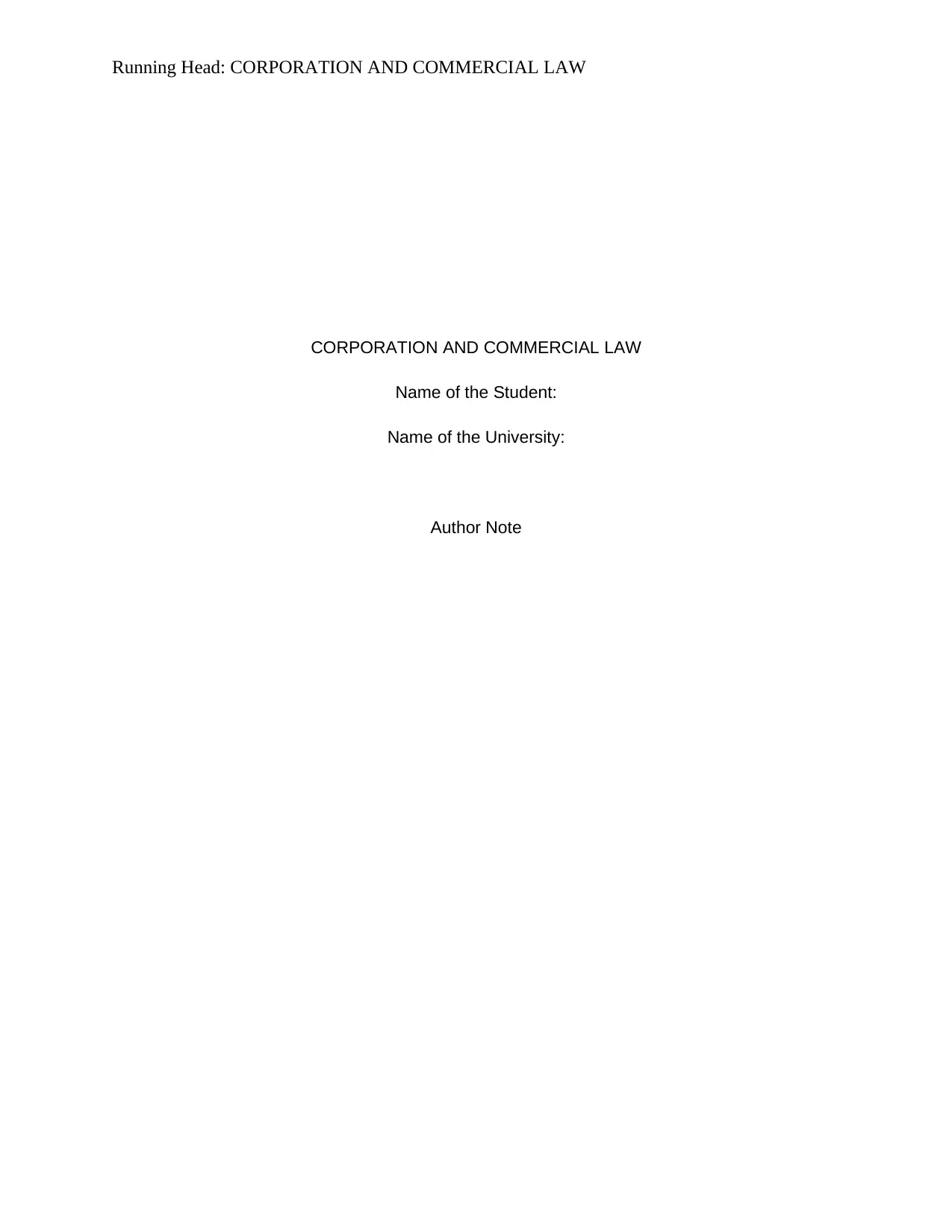
Running Head: CORPORATION AND COMMERCIAL LAW
CORPORATION AND COMMERCIAL LAW
Name of the Student:
Name of the University:
Author Note
CORPORATION AND COMMERCIAL LAW
Name of the Student:
Name of the University:
Author Note
Paraphrase This Document
Need a fresh take? Get an instant paraphrase of this document with our AI Paraphraser
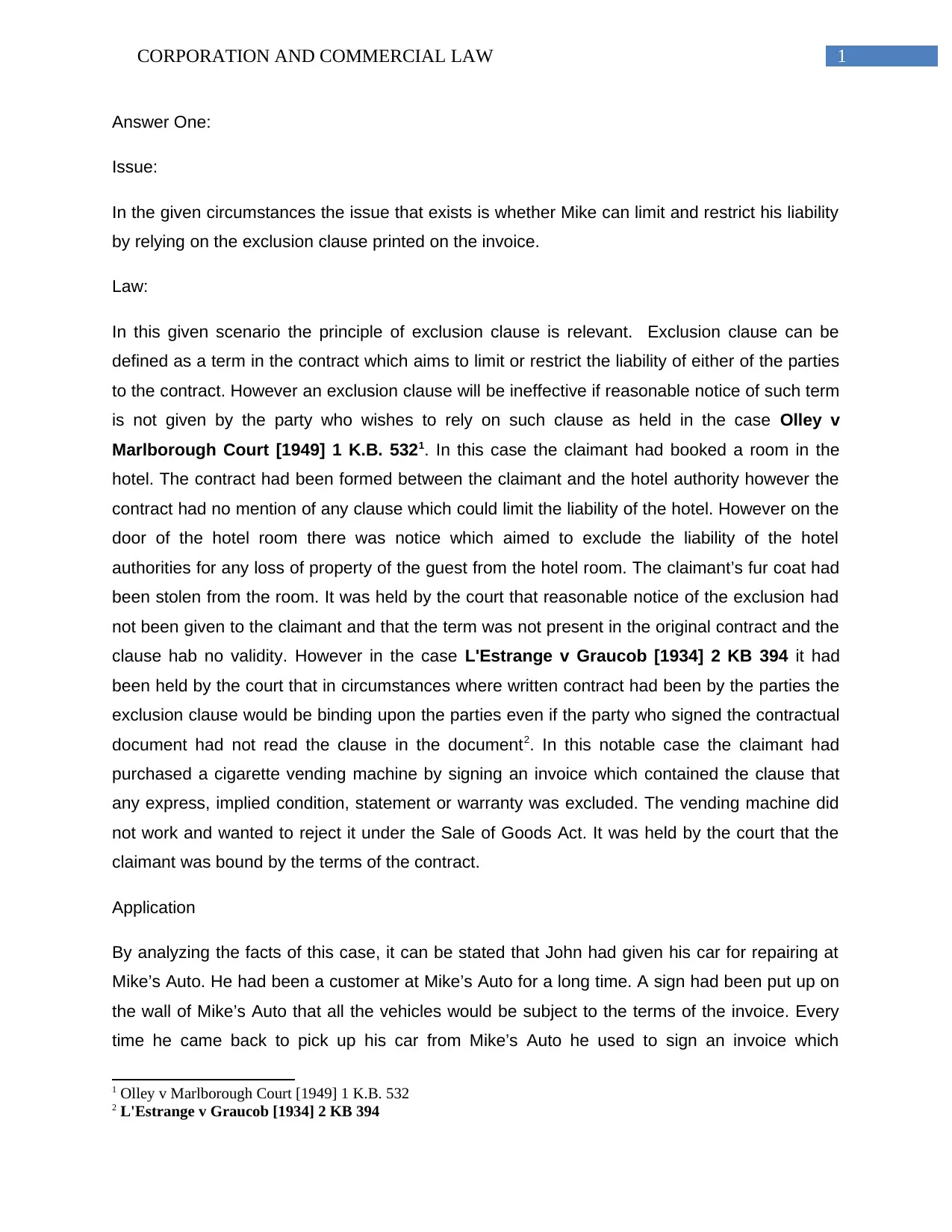
1CORPORATION AND COMMERCIAL LAW
Answer One:
Issue:
In the given circumstances the issue that exists is whether Mike can limit and restrict his liability
by relying on the exclusion clause printed on the invoice.
Law:
In this given scenario the principle of exclusion clause is relevant. Exclusion clause can be
defined as a term in the contract which aims to limit or restrict the liability of either of the parties
to the contract. However an exclusion clause will be ineffective if reasonable notice of such term
is not given by the party who wishes to rely on such clause as held in the case Olley v
Marlborough Court [1949] 1 K.B. 5321. In this case the claimant had booked a room in the
hotel. The contract had been formed between the claimant and the hotel authority however the
contract had no mention of any clause which could limit the liability of the hotel. However on the
door of the hotel room there was notice which aimed to exclude the liability of the hotel
authorities for any loss of property of the guest from the hotel room. The claimant’s fur coat had
been stolen from the room. It was held by the court that reasonable notice of the exclusion had
not been given to the claimant and that the term was not present in the original contract and the
clause hab no validity. However in the case L'Estrange v Graucob [1934] 2 KB 394 it had
been held by the court that in circumstances where written contract had been by the parties the
exclusion clause would be binding upon the parties even if the party who signed the contractual
document had not read the clause in the document2. In this notable case the claimant had
purchased a cigarette vending machine by signing an invoice which contained the clause that
any express, implied condition, statement or warranty was excluded. The vending machine did
not work and wanted to reject it under the Sale of Goods Act. It was held by the court that the
claimant was bound by the terms of the contract.
Application
By analyzing the facts of this case, it can be stated that John had given his car for repairing at
Mike’s Auto. He had been a customer at Mike’s Auto for a long time. A sign had been put up on
the wall of Mike’s Auto that all the vehicles would be subject to the terms of the invoice. Every
time he came back to pick up his car from Mike’s Auto he used to sign an invoice which
1 Olley v Marlborough Court [1949] 1 K.B. 532
2 L'Estrange v Graucob [1934] 2 KB 394
Answer One:
Issue:
In the given circumstances the issue that exists is whether Mike can limit and restrict his liability
by relying on the exclusion clause printed on the invoice.
Law:
In this given scenario the principle of exclusion clause is relevant. Exclusion clause can be
defined as a term in the contract which aims to limit or restrict the liability of either of the parties
to the contract. However an exclusion clause will be ineffective if reasonable notice of such term
is not given by the party who wishes to rely on such clause as held in the case Olley v
Marlborough Court [1949] 1 K.B. 5321. In this case the claimant had booked a room in the
hotel. The contract had been formed between the claimant and the hotel authority however the
contract had no mention of any clause which could limit the liability of the hotel. However on the
door of the hotel room there was notice which aimed to exclude the liability of the hotel
authorities for any loss of property of the guest from the hotel room. The claimant’s fur coat had
been stolen from the room. It was held by the court that reasonable notice of the exclusion had
not been given to the claimant and that the term was not present in the original contract and the
clause hab no validity. However in the case L'Estrange v Graucob [1934] 2 KB 394 it had
been held by the court that in circumstances where written contract had been by the parties the
exclusion clause would be binding upon the parties even if the party who signed the contractual
document had not read the clause in the document2. In this notable case the claimant had
purchased a cigarette vending machine by signing an invoice which contained the clause that
any express, implied condition, statement or warranty was excluded. The vending machine did
not work and wanted to reject it under the Sale of Goods Act. It was held by the court that the
claimant was bound by the terms of the contract.
Application
By analyzing the facts of this case, it can be stated that John had given his car for repairing at
Mike’s Auto. He had been a customer at Mike’s Auto for a long time. A sign had been put up on
the wall of Mike’s Auto that all the vehicles would be subject to the terms of the invoice. Every
time he came back to pick up his car from Mike’s Auto he used to sign an invoice which
1 Olley v Marlborough Court [1949] 1 K.B. 532
2 L'Estrange v Graucob [1934] 2 KB 394
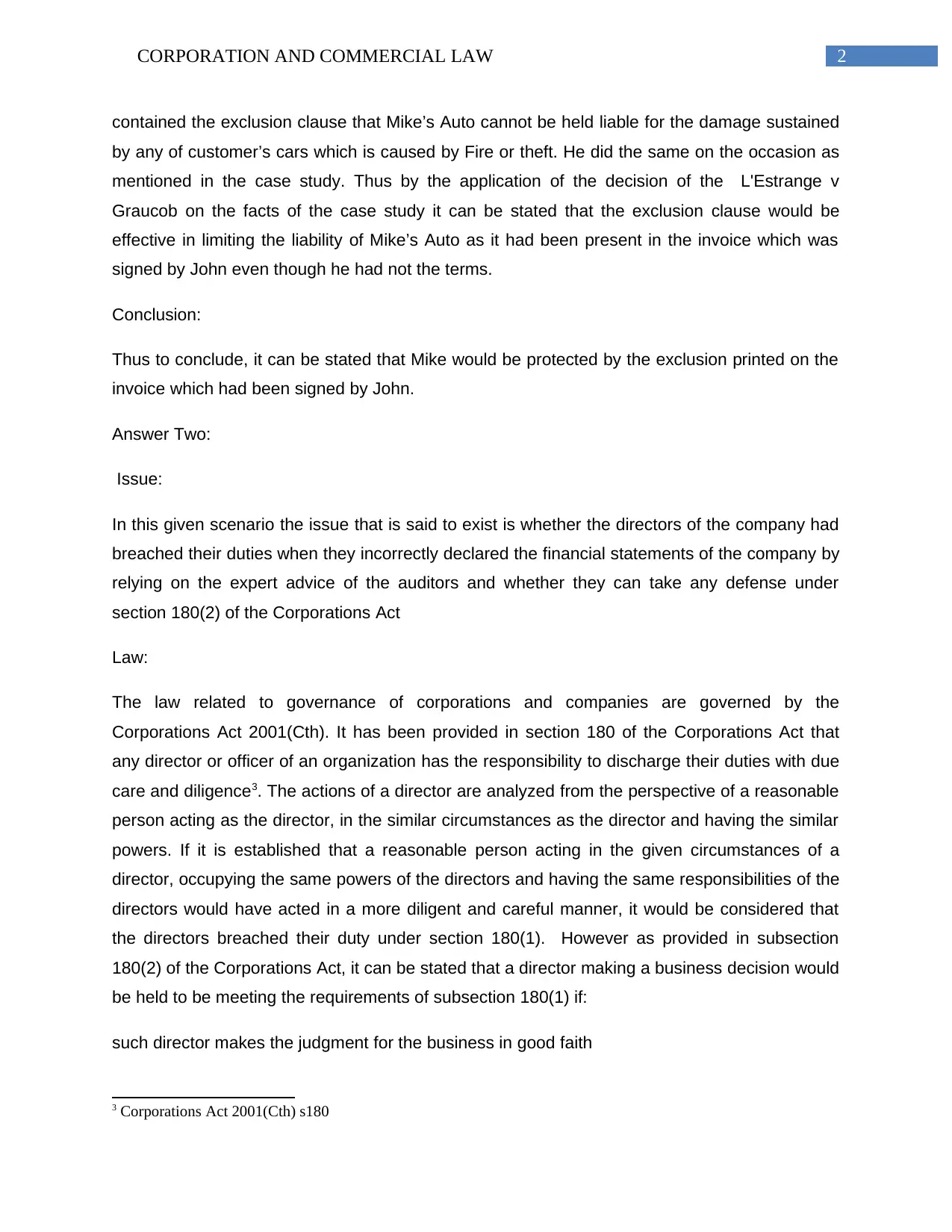
2CORPORATION AND COMMERCIAL LAW
contained the exclusion clause that Mike’s Auto cannot be held liable for the damage sustained
by any of customer’s cars which is caused by Fire or theft. He did the same on the occasion as
mentioned in the case study. Thus by the application of the decision of the L'Estrange v
Graucob on the facts of the case study it can be stated that the exclusion clause would be
effective in limiting the liability of Mike’s Auto as it had been present in the invoice which was
signed by John even though he had not the terms.
Conclusion:
Thus to conclude, it can be stated that Mike would be protected by the exclusion printed on the
invoice which had been signed by John.
Answer Two:
Issue:
In this given scenario the issue that is said to exist is whether the directors of the company had
breached their duties when they incorrectly declared the financial statements of the company by
relying on the expert advice of the auditors and whether they can take any defense under
section 180(2) of the Corporations Act
Law:
The law related to governance of corporations and companies are governed by the
Corporations Act 2001(Cth). It has been provided in section 180 of the Corporations Act that
any director or officer of an organization has the responsibility to discharge their duties with due
care and diligence3. The actions of a director are analyzed from the perspective of a reasonable
person acting as the director, in the similar circumstances as the director and having the similar
powers. If it is established that a reasonable person acting in the given circumstances of a
director, occupying the same powers of the directors and having the same responsibilities of the
directors would have acted in a more diligent and careful manner, it would be considered that
the directors breached their duty under section 180(1). However as provided in subsection
180(2) of the Corporations Act, it can be stated that a director making a business decision would
be held to be meeting the requirements of subsection 180(1) if:
such director makes the judgment for the business in good faith
3 Corporations Act 2001(Cth) s180
contained the exclusion clause that Mike’s Auto cannot be held liable for the damage sustained
by any of customer’s cars which is caused by Fire or theft. He did the same on the occasion as
mentioned in the case study. Thus by the application of the decision of the L'Estrange v
Graucob on the facts of the case study it can be stated that the exclusion clause would be
effective in limiting the liability of Mike’s Auto as it had been present in the invoice which was
signed by John even though he had not the terms.
Conclusion:
Thus to conclude, it can be stated that Mike would be protected by the exclusion printed on the
invoice which had been signed by John.
Answer Two:
Issue:
In this given scenario the issue that is said to exist is whether the directors of the company had
breached their duties when they incorrectly declared the financial statements of the company by
relying on the expert advice of the auditors and whether they can take any defense under
section 180(2) of the Corporations Act
Law:
The law related to governance of corporations and companies are governed by the
Corporations Act 2001(Cth). It has been provided in section 180 of the Corporations Act that
any director or officer of an organization has the responsibility to discharge their duties with due
care and diligence3. The actions of a director are analyzed from the perspective of a reasonable
person acting as the director, in the similar circumstances as the director and having the similar
powers. If it is established that a reasonable person acting in the given circumstances of a
director, occupying the same powers of the directors and having the same responsibilities of the
directors would have acted in a more diligent and careful manner, it would be considered that
the directors breached their duty under section 180(1). However as provided in subsection
180(2) of the Corporations Act, it can be stated that a director making a business decision would
be held to be meeting the requirements of subsection 180(1) if:
such director makes the judgment for the business in good faith
3 Corporations Act 2001(Cth) s180
⊘ This is a preview!⊘
Do you want full access?
Subscribe today to unlock all pages.

Trusted by 1+ million students worldwide
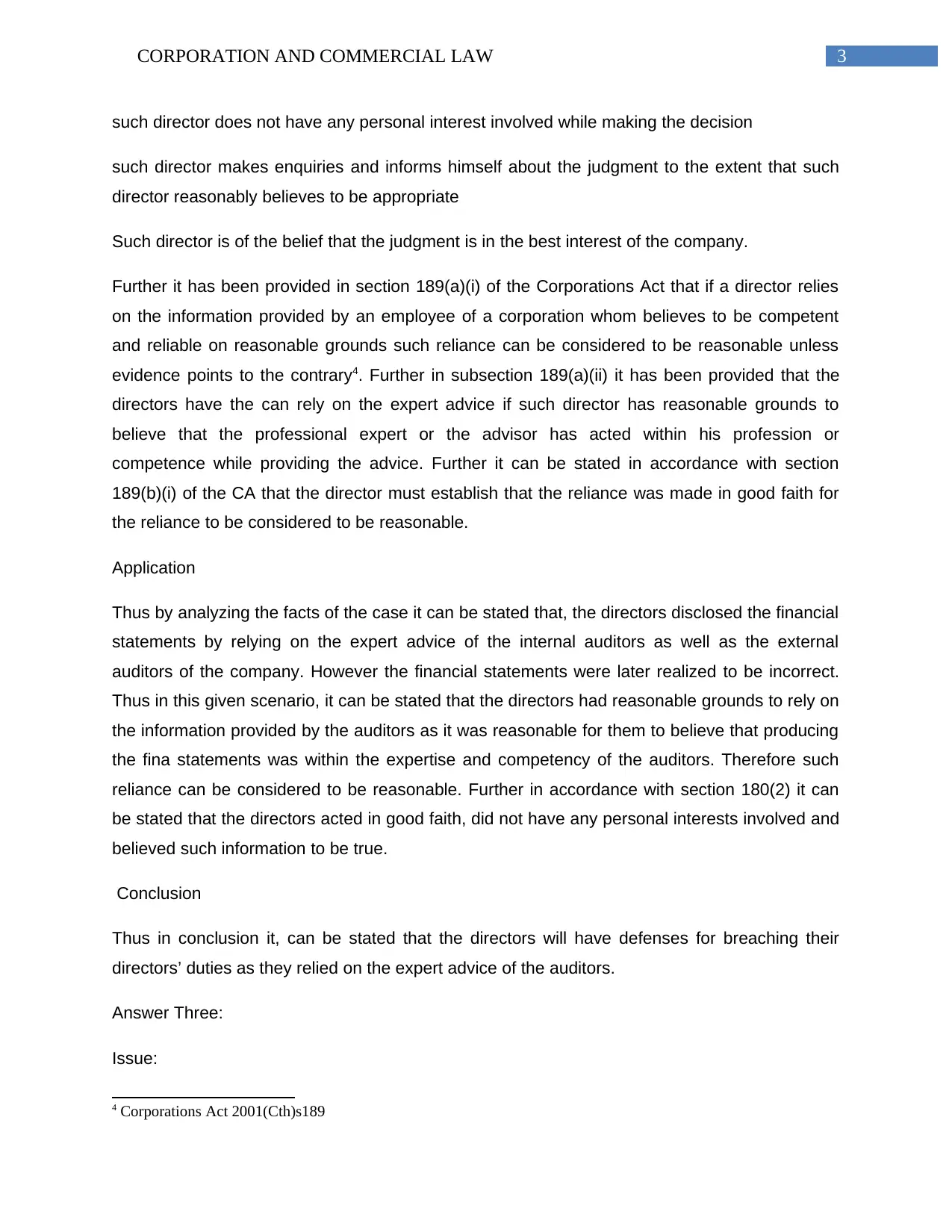
3CORPORATION AND COMMERCIAL LAW
such director does not have any personal interest involved while making the decision
such director makes enquiries and informs himself about the judgment to the extent that such
director reasonably believes to be appropriate
Such director is of the belief that the judgment is in the best interest of the company.
Further it has been provided in section 189(a)(i) of the Corporations Act that if a director relies
on the information provided by an employee of a corporation whom believes to be competent
and reliable on reasonable grounds such reliance can be considered to be reasonable unless
evidence points to the contrary4. Further in subsection 189(a)(ii) it has been provided that the
directors have the can rely on the expert advice if such director has reasonable grounds to
believe that the professional expert or the advisor has acted within his profession or
competence while providing the advice. Further it can be stated in accordance with section
189(b)(i) of the CA that the director must establish that the reliance was made in good faith for
the reliance to be considered to be reasonable.
Application
Thus by analyzing the facts of the case it can be stated that, the directors disclosed the financial
statements by relying on the expert advice of the internal auditors as well as the external
auditors of the company. However the financial statements were later realized to be incorrect.
Thus in this given scenario, it can be stated that the directors had reasonable grounds to rely on
the information provided by the auditors as it was reasonable for them to believe that producing
the fina statements was within the expertise and competency of the auditors. Therefore such
reliance can be considered to be reasonable. Further in accordance with section 180(2) it can
be stated that the directors acted in good faith, did not have any personal interests involved and
believed such information to be true.
Conclusion
Thus in conclusion it, can be stated that the directors will have defenses for breaching their
directors’ duties as they relied on the expert advice of the auditors.
Answer Three:
Issue:
4 Corporations Act 2001(Cth)s189
such director does not have any personal interest involved while making the decision
such director makes enquiries and informs himself about the judgment to the extent that such
director reasonably believes to be appropriate
Such director is of the belief that the judgment is in the best interest of the company.
Further it has been provided in section 189(a)(i) of the Corporations Act that if a director relies
on the information provided by an employee of a corporation whom believes to be competent
and reliable on reasonable grounds such reliance can be considered to be reasonable unless
evidence points to the contrary4. Further in subsection 189(a)(ii) it has been provided that the
directors have the can rely on the expert advice if such director has reasonable grounds to
believe that the professional expert or the advisor has acted within his profession or
competence while providing the advice. Further it can be stated in accordance with section
189(b)(i) of the CA that the director must establish that the reliance was made in good faith for
the reliance to be considered to be reasonable.
Application
Thus by analyzing the facts of the case it can be stated that, the directors disclosed the financial
statements by relying on the expert advice of the internal auditors as well as the external
auditors of the company. However the financial statements were later realized to be incorrect.
Thus in this given scenario, it can be stated that the directors had reasonable grounds to rely on
the information provided by the auditors as it was reasonable for them to believe that producing
the fina statements was within the expertise and competency of the auditors. Therefore such
reliance can be considered to be reasonable. Further in accordance with section 180(2) it can
be stated that the directors acted in good faith, did not have any personal interests involved and
believed such information to be true.
Conclusion
Thus in conclusion it, can be stated that the directors will have defenses for breaching their
directors’ duties as they relied on the expert advice of the auditors.
Answer Three:
Issue:
4 Corporations Act 2001(Cth)s189
Paraphrase This Document
Need a fresh take? Get an instant paraphrase of this document with our AI Paraphraser
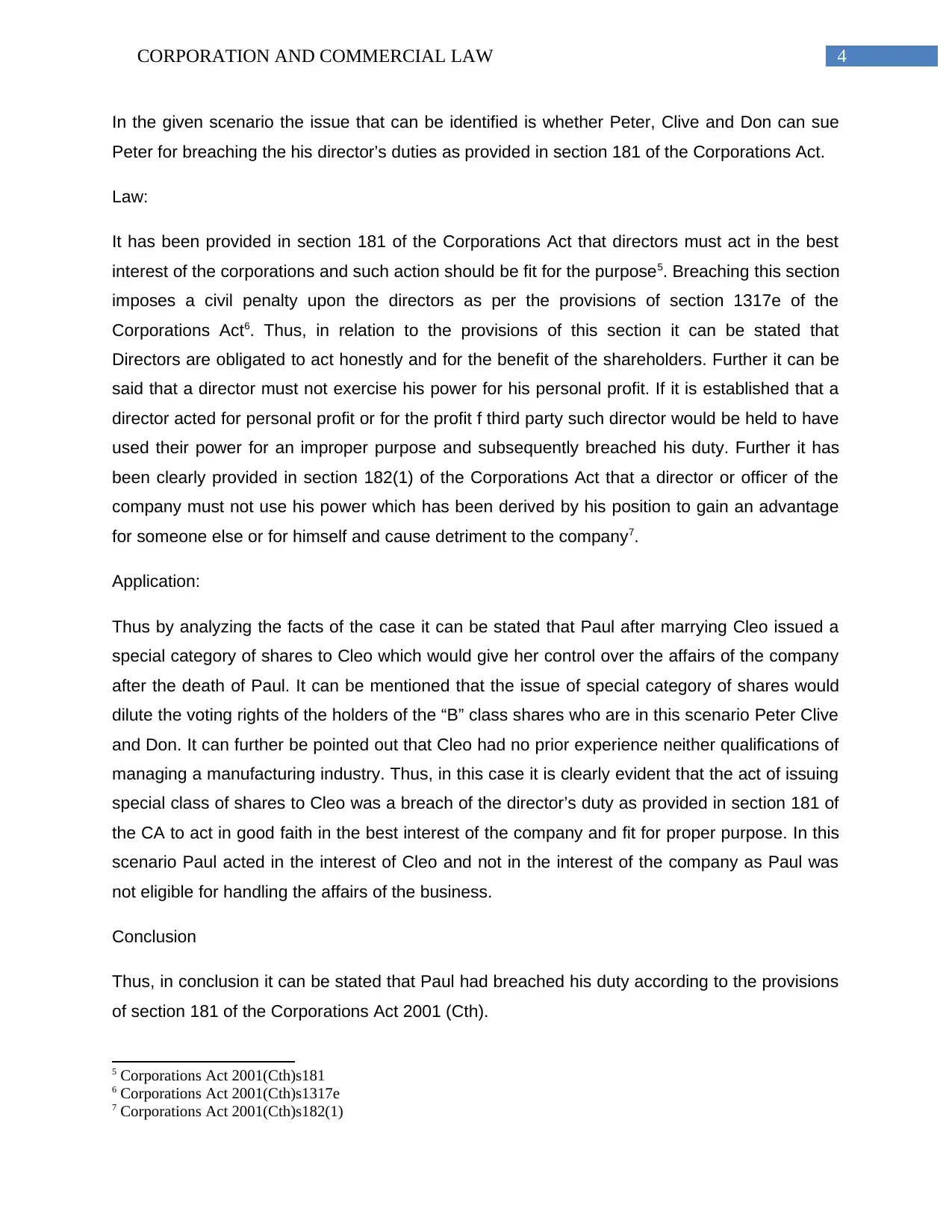
4CORPORATION AND COMMERCIAL LAW
In the given scenario the issue that can be identified is whether Peter, Clive and Don can sue
Peter for breaching the his director’s duties as provided in section 181 of the Corporations Act.
Law:
It has been provided in section 181 of the Corporations Act that directors must act in the best
interest of the corporations and such action should be fit for the purpose5. Breaching this section
imposes a civil penalty upon the directors as per the provisions of section 1317e of the
Corporations Act6. Thus, in relation to the provisions of this section it can be stated that
Directors are obligated to act honestly and for the benefit of the shareholders. Further it can be
said that a director must not exercise his power for his personal profit. If it is established that a
director acted for personal profit or for the profit f third party such director would be held to have
used their power for an improper purpose and subsequently breached his duty. Further it has
been clearly provided in section 182(1) of the Corporations Act that a director or officer of the
company must not use his power which has been derived by his position to gain an advantage
for someone else or for himself and cause detriment to the company7.
Application:
Thus by analyzing the facts of the case it can be stated that Paul after marrying Cleo issued a
special category of shares to Cleo which would give her control over the affairs of the company
after the death of Paul. It can be mentioned that the issue of special category of shares would
dilute the voting rights of the holders of the “B” class shares who are in this scenario Peter Clive
and Don. It can further be pointed out that Cleo had no prior experience neither qualifications of
managing a manufacturing industry. Thus, in this case it is clearly evident that the act of issuing
special class of shares to Cleo was a breach of the director’s duty as provided in section 181 of
the CA to act in good faith in the best interest of the company and fit for proper purpose. In this
scenario Paul acted in the interest of Cleo and not in the interest of the company as Paul was
not eligible for handling the affairs of the business.
Conclusion
Thus, in conclusion it can be stated that Paul had breached his duty according to the provisions
of section 181 of the Corporations Act 2001 (Cth).
5 Corporations Act 2001(Cth)s181
6 Corporations Act 2001(Cth)s1317e
7 Corporations Act 2001(Cth)s182(1)
In the given scenario the issue that can be identified is whether Peter, Clive and Don can sue
Peter for breaching the his director’s duties as provided in section 181 of the Corporations Act.
Law:
It has been provided in section 181 of the Corporations Act that directors must act in the best
interest of the corporations and such action should be fit for the purpose5. Breaching this section
imposes a civil penalty upon the directors as per the provisions of section 1317e of the
Corporations Act6. Thus, in relation to the provisions of this section it can be stated that
Directors are obligated to act honestly and for the benefit of the shareholders. Further it can be
said that a director must not exercise his power for his personal profit. If it is established that a
director acted for personal profit or for the profit f third party such director would be held to have
used their power for an improper purpose and subsequently breached his duty. Further it has
been clearly provided in section 182(1) of the Corporations Act that a director or officer of the
company must not use his power which has been derived by his position to gain an advantage
for someone else or for himself and cause detriment to the company7.
Application:
Thus by analyzing the facts of the case it can be stated that Paul after marrying Cleo issued a
special category of shares to Cleo which would give her control over the affairs of the company
after the death of Paul. It can be mentioned that the issue of special category of shares would
dilute the voting rights of the holders of the “B” class shares who are in this scenario Peter Clive
and Don. It can further be pointed out that Cleo had no prior experience neither qualifications of
managing a manufacturing industry. Thus, in this case it is clearly evident that the act of issuing
special class of shares to Cleo was a breach of the director’s duty as provided in section 181 of
the CA to act in good faith in the best interest of the company and fit for proper purpose. In this
scenario Paul acted in the interest of Cleo and not in the interest of the company as Paul was
not eligible for handling the affairs of the business.
Conclusion
Thus, in conclusion it can be stated that Paul had breached his duty according to the provisions
of section 181 of the Corporations Act 2001 (Cth).
5 Corporations Act 2001(Cth)s181
6 Corporations Act 2001(Cth)s1317e
7 Corporations Act 2001(Cth)s182(1)
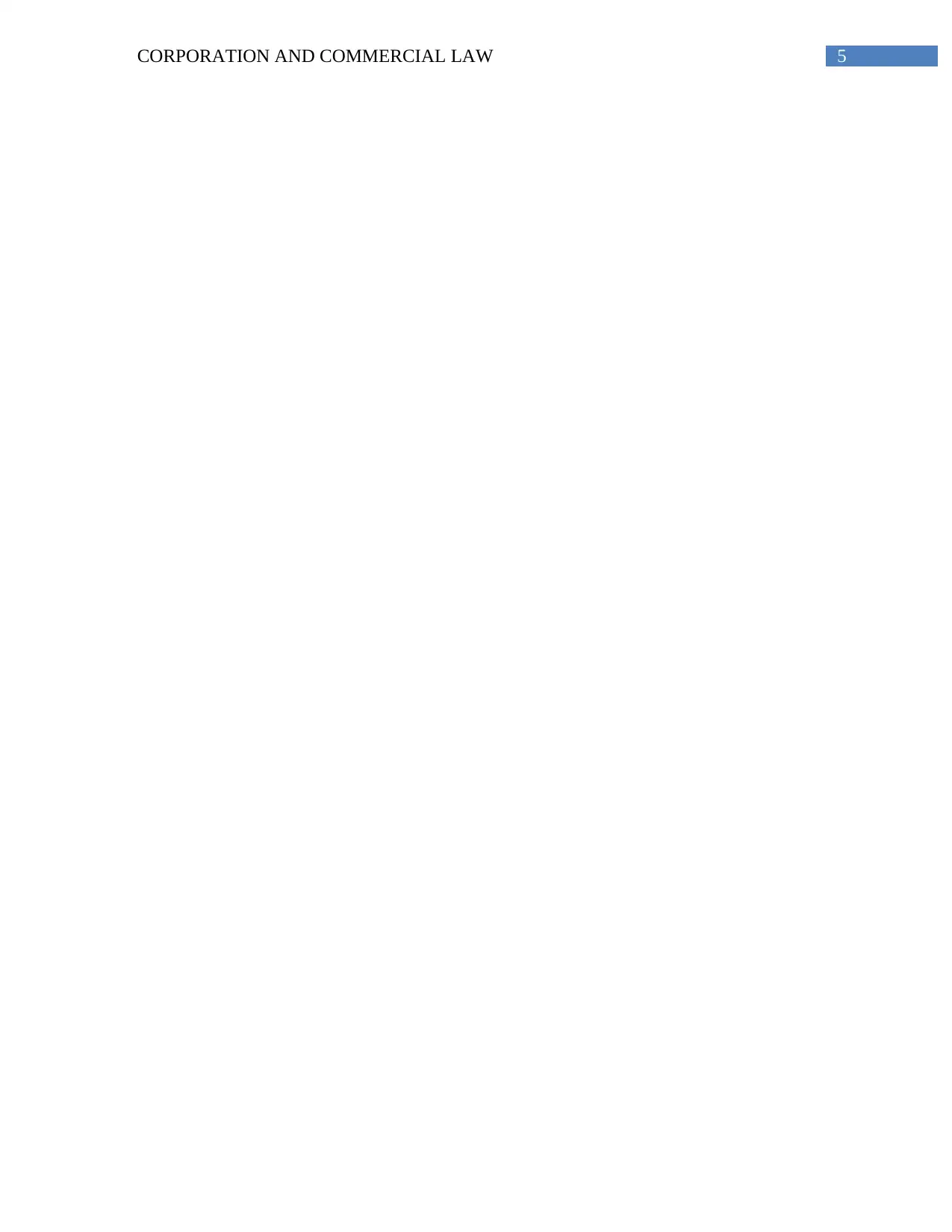
5CORPORATION AND COMMERCIAL LAW
⊘ This is a preview!⊘
Do you want full access?
Subscribe today to unlock all pages.

Trusted by 1+ million students worldwide
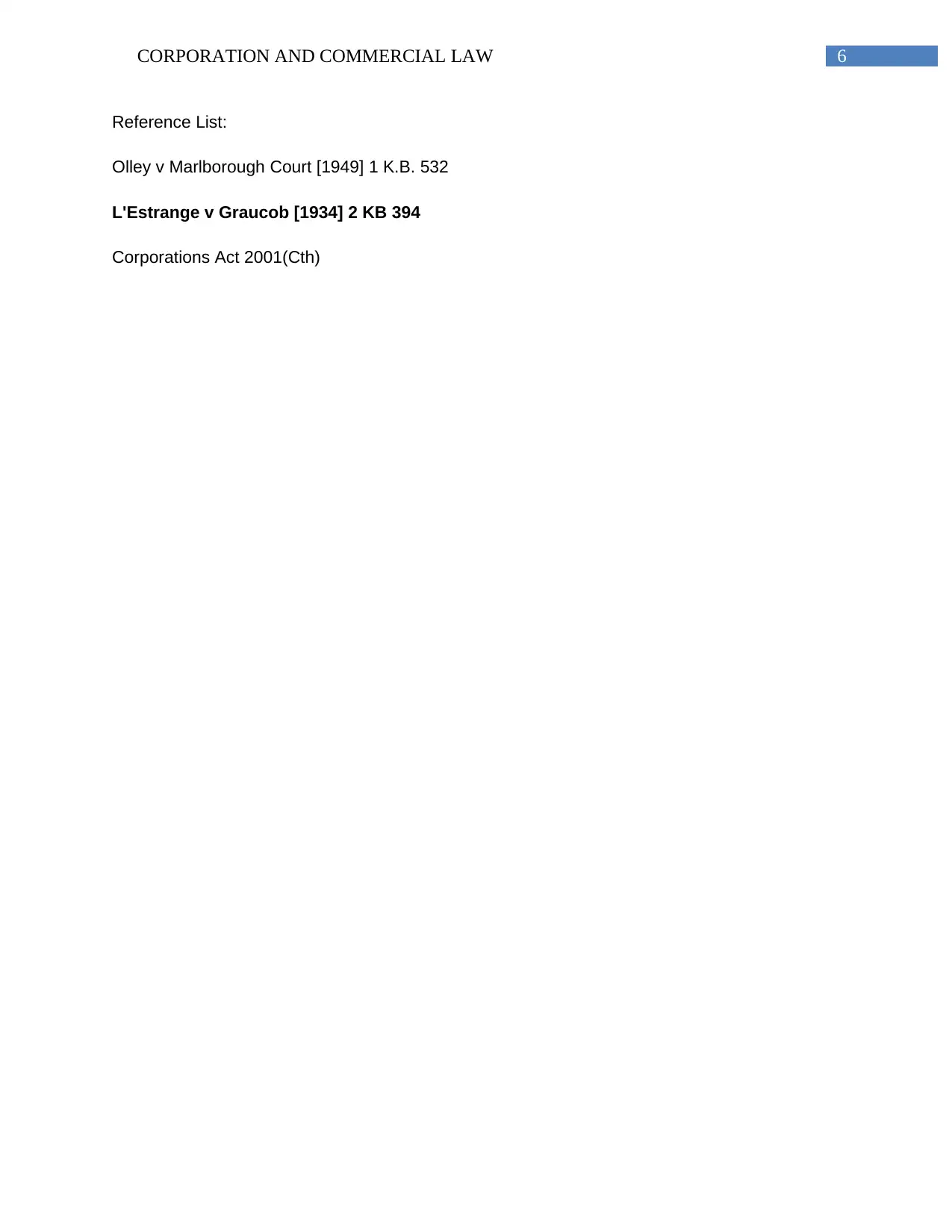
6CORPORATION AND COMMERCIAL LAW
Reference List:
Olley v Marlborough Court [1949] 1 K.B. 532
L'Estrange v Graucob [1934] 2 KB 394
Corporations Act 2001(Cth)
Reference List:
Olley v Marlborough Court [1949] 1 K.B. 532
L'Estrange v Graucob [1934] 2 KB 394
Corporations Act 2001(Cth)
1 out of 7
Related Documents
Your All-in-One AI-Powered Toolkit for Academic Success.
+13062052269
info@desklib.com
Available 24*7 on WhatsApp / Email
![[object Object]](/_next/static/media/star-bottom.7253800d.svg)
Unlock your academic potential
Copyright © 2020–2026 A2Z Services. All Rights Reserved. Developed and managed by ZUCOL.




